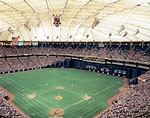By Michael Khoo
Minnesota Public Radio
October 8, 2002
The excitement around the Minnesota Twins is generating new interest in ballpark plans, and the issue figures to resurface next year when a new governor is sworn in.
| |
|
|
|
||
Last November, it appeared as though there might not be a 2002 Minnesota Twins season. Baseball owners agreed to eliminate -- or contract -- two franchises and the Twins were seen as a more-than-likely candidate.
After much legal maneuvering, the team took the field last spring only to face, by late summer, the possibility of a players' strike, a threat that was defused in the final hours of labor negotiations. Having survived obstacle after obstacle to reach the American League Championship Series, from the bleachers the team seems somehow blessed.
Independence Party gubernatorial candidate Tim Penny says the Twins' unlikely 2002 saga is renewing interest in providing for the team's future.
"We're back in the euphoria of having a team that's winning again. These things do ebb and flow, as you know, but it's certainly helpful. It reminds us that in the final analysis, we don't want to lose professional sports," Penny said.
But the team has said -- and continues to say -- that without a new ballpark, the team's long-term survival is in serious doubt.
Lawmakers, working with Gov. Jesse Ventura, helped craft a stadium solution earlier this year, but the plan failed to bring the team and potential host cities together.
Twins spokesman Dave St. Peter says team officials hope they can build on their momentum and produce new ballpark legislation in 2003. St. Peter says the face of the debate has changed remarkably over the summer.
"The threat of contraction is gone, at least for the next several years. A new collective bargaining agreement has been reached, so we have taken steps to address the basic economic flaws in the game and hopefully creating a new system that will enable teams such as Minnesota and Milwaukee and Pittsburgh to compete. And obviously our team has had a magical year," he said.
DFL gubernatorial candidate Roger Moe says he's willing to re-open the ballpark debate to address lingering concerns. Last session's plan called for state financing of a $330 million facility, with the debt to be repaid by the team and a city partner. But Moe says the pool of host communities may have been too small.
"The most frequent complaint about the legislation comes from, I think, Minneapolis that wanted Hennepin County added as a part of that legislation. I've said that if the Hennepin County Board approves and wants to be added, I would support that legislation," Moe said.
Penny, Moe, GOP candidate Tim Pawlenty, and Green Party nominee Ken Pentel all say they'd allow a minor change to the legislation, such as opening it up for county participation. But Pawlenty, who voted against the bill in his role as House Majority Leader, says he'll fight attempts to increase the state's participation. He does, however, leave the door open for a joint Vikings-University of Minnesota football stadium
Pawlenty says he'd support a state contribution for a college-level facility for the Gophers. "But they don't need a stadium anything like an NFL stadium. And if the Vikings wanted to be a partner and pay for -- fully -- for their share, and so that the state wasn't subsidizing their share of the stadium, I might be open to that," Pawlenty said.
A Vikings consultant says the team continues to work with the university to draft stadium design and operating plans for a $500 million stadium. The report is expected by early December. Of all the major party candidates, however, Green nominee Pentel remains the most reluctant to discuss pro-sport facilities.
"Professional sports to me is not even on the table right now for the things that Minnesota has to deal with. As long as our fish are unedible and our water's undrinkable and the Mississippi River's being turned into a sludge canal; it makes me sad how much time and energy gets spent on this diversion," said Pentel.
But stadium talk is unlikely to fade anytime soon; nor are its complexities. Vikings owner Red McCombs and Twins owner Carl Pohlad have both indicated their willingness to sell their teams, creating the possibility of a new cast of characters for next year's stadium fight.
More from MPR
